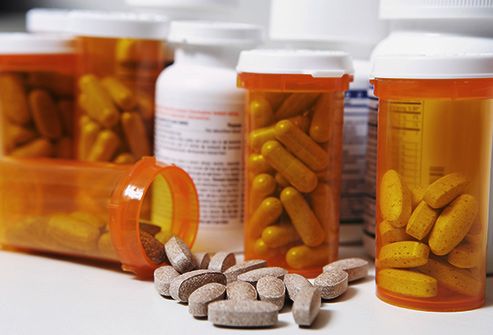12 Good Things That Can Go Bad

You can do a number on your body if you hit the gym too hard. Overuse can damage joints, tendons, ligaments, and even your heart. Women who exercise too much may start missing periods or speed up the bone loss that leads to osteoporosis. How much is too much? If your workouts leave you exhausted or irritable, or if you have a hard time sleeping, eating, or concentrating, it might be time to scale back.

If you snooze beyond your typical 40 winks, you could do your body more harm than good. Studies show that more than 8 hours of sleep every night increases your risk of death from heart problems by 34%. You also can have trouble with concentration, weight, and blood sugar levels.

Antibiotics kill many of the bacteria that cause infection and sickness. So what could be the harm in taking some if you have the sniffles? Turns out, bacteria can change if they’re in contact with antibiotics too often. This makes them resistant to the drugs. Take antibiotics only when you’re sure you need them.

It feels good to make people happy -- but there’s a fine line between being helpful and being a pushover. If you agree with others just to keep the peace or take on too many tasks because you can’t say no, it can make you unhappy.

Practice these turn-down skills to help save your sanity: Ask questions to be sure you know what you’re getting into. Ask yourself this: What’s in it for you? Then answer firmly, and know you don’t have to give a reason for your refusal. “No” can be a complete sentence.

The jury’s still out on whether you can be “addicted” to sex. However, you can have an overactive sex drive. This makes you think about and act on sexual feelings more than the average person. When you focus most of your attention on sex, it can affect your everyday life and relationships in a negative way.

In some cases, your focus on sex can be caused by other medical problems. Check with your doctor to see if it might stem from medications you take, situations of abuse, or possibly even a brain tumor. Support groups and counseling can also help you get your life back to normal.

This is the best way to keep germs at bay. Suds up too often, though, and your hygiene could actually suffer. Studies show that too much can damage your skin and give germs a place to grow and thrive.

You only eat food that’s good for you? Great! But how much do you eat? Overeating causes high blood pressure, high cholesterol, type 2 diabetes, bone and joint problems, sleep problems, and even depression -- no matter what kind of food you put on your plate. And if you take in more calories than you burn, you’ll gain weight, which can lead to heart disease and stroke.

It’s rare, but you can drink too much water. When you do, your kidneys can’t get rid of the extra fluid fast enough. This drops the sodium in your blood to unhealthy levels -- a condition called hyponatremia. It can cause nausea, weakness and fatigue, headache, or, in severe cases, seizures, coma, and death. You’re at higher risk if you’re an athlete who exercises for long stretches of time, like a marathon runner.

Do you stay at the office long past quitting time? Maybe you really love what you do -- or maybe you’re a workaholic. If you feel like you should be working all the time and tend to choose work over relationships, that might be you. Remember what they say about all work and no play.

They make a lot of things easier, but if you can’t stop looking at yours, your smartphone can make your real life harder. It can affect how you relate to people, your mood, your sleep quality, and even your brain chemistry.

Change things up. Schedule different things to do at the times you’re most likely to be on your phone. Set limits on the amount of time you want to spend on it and turn it off when you’re not using it. And seek support -- friends and family can help keep you in check.

They’ll keep you and your family healthy, right? Maybe not. Too much iron can cause nausea and vomiting, and if you overdo the vitamin C, it can lead to nausea, diarrhea, and stomach cramps. Too much vitamin A can cause vision problems, among other things. Excess vitamin D can make muscles weak, and it can even lead to heart problems. And vitamins K and E can cause bleeding issues. You and your family should stick to the daily dose, and nothing more.

You can never have too many friends, right? Well, maybe. According to some studies, the number of people you can really call “friend” is around 150 to 200. Your brain can’t process more than that. And for best friendships, the number is much lower -- around five. Research is ongoing, though, especially as social media connects people in new and different ways.